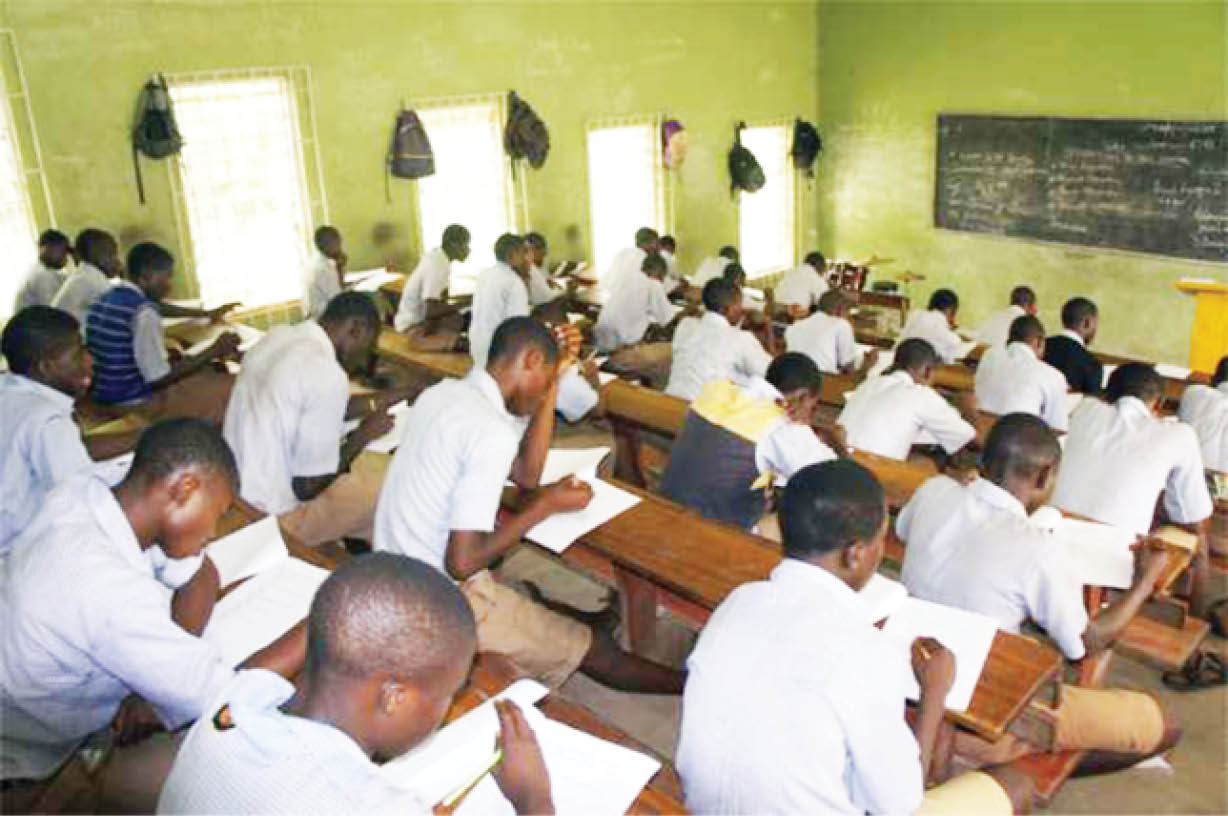Schools including higher institutions have since remained shut as other sectors in the COVID-19 lockdown, and the lengthy closures are not without dire consequences on the nation’s fragile educational system.
A few lessons are conducted remotely in an attempt to bridge the gap created by the Covid-19 induced closure of schools in the country, but most academic activities such as the senior certificate examination conducted by the West African Examinations Council (WAEC), National Examination Council (NECO) and National Business and Technical Examination Board (NABTEB) have been cancelled till the lockdown ends. Many schools were unable to complete terminal and in-class examinations before the beginning of the lockdown.
The Minister of Education, Adamu Adamu, had in a statement on April 3, said plans were being made for students in public secondary schools to receive lessons via radio and television to bridge the gap created by the lockdown.
Similarly, higher institutions were advised to resort to virtual learning but university lecturers have expressed concern over the workability of the move mainly due inadequate training and resources.
In Imo State, students were preparing for the junior and senior secondary school examinations, as well as the National Common Entrance Examination (NCEE) before the lockdown. The examination which would have been taken on March 28 was also suspended.
Most schools, especially primary and secondary schools, hurriedly closed without taking the second term examinations. Those which did forced their students to take more than 14 papers in two days.
Our correspondent gathered that schools run by the Catholic Archdiocese of Owerri took their second term examinations before they were asked to go home. It was gathered that at Owerri Girls Secondary School, the students wrote all their papers within 48 hours.
A student who spoke on condition of anonymity said she was not sure of passing the examination.
She said, “I am not sure of passing because the 17 papers were taken in four days, under normal circumstances, the papers were spread over two to three weeks.”
The fate of students in tertiary institutions also hangs in the balance as the lockdown started a few days after the Academic Staff Union of Universities (ASUU) started a two-week warning strike which they eventually upgraded to an indefinite strike.

Most of the students who stayed behind with the belief that the lecturers would call off the strike after the warning strike were caught off guard.
The chairman of ASUU Federal University of Technology, Owerri (FUTO) chapter, Victory Echereobia, said education, just like other sectors of the Nigerian economy, would not be the same after the pandemic.
He said, “There is no doubt that the education sector will be adversely affected by the ravaging pandemic, coupled with the government’s non-challant attitude to the sector. Right now, we are on strike and we do not know what will happen after COVID -19. Everything lies with the government. We don’t know what the government will do. We are ready for negotiations if they call our members to a round table discussion. We believe that they will be responsive but the whole system will not be same again. We are talking about online teaching when we know that we don’t have facilities. Even if we have the facilities, where is power? No power, internet cloud. People are using their money to power their generators and buy data. The whole situation is compounded by this virus. Right now, everybody is thinking of survival first.”
The Ebonyi State government has last week introduced a radio and television learning programme for learners in primary and secondary schools.
The Commissioner for Education, Prof. Onyibuchi Chima, said the programme is in two phases.
He said, “One is for pupils in primary schools and students in secondary schools. The other is for teachers and it is designed to train them and keep them in tune with teaching during this period of COVID-19 restrictions.”

In Enugu, Mrs. Patience Ike, a banker, said her three children engage in vocational skills acquisition and carry out household chores occasionally while waiting for schools to reopen.
“But beyond that, we also try to keep them busy with books. Last week, their father gave them some story books and asked them to summarise the stories after reading. That is one of the ways we’re keeping them busy,” she said.
She said her children who are schooling at the University of Nigeria, Enugu Campus Staff Primary School, were worried that they had to stay at home, thus missing their school, friends and academic activities.
“We have thought of taking them to the local public libraries but the libraries are closed down as well. So, we introduced them to computer games, colour, rhymes and things like that to enhance their phonics,” she said.
Another Enugu-based woman, Mrs. Chinagorom Anyanwu, said she bought new books for her children to keep them busy so that they would not forget all they were taught in school before the closure.
“My husband and I nursed the idea of bringing one of their teachers to be coaching them here in the sitting-room. But we also thought about the health implication. While you are sure your children have not been visiting people, we are not certain the teacher is safe,” she said.
Mrs. Anyanwu said her husband would install internet facilities at home for the kids to continue learning and research.
“Our first son is attending a Catholic seminary and right now he is in the village with my parents-in-law. He prefers to stay there. But I have spoken with them on phone concerning how to keep him busy with his books so that he wouldn’t spend the entire period of the lockdown to remain idle,” she said.
An SSS 2 student of Capville School, Abuja, Chioma Azubuike, said the lockdown had put her education on hold.
“I am not happy about the fact that I have to stay at home. I am praying for the school to reopen so that I complete my studies. I had to join an online class in a different school to acquire more knowledge though it is hard to understand online lessons. I still have to try my best because I don’t know when the lockdown is going to end, nothing feels better than studying with the scheme you are used to,” she said.

A 100 Level student of Theatre and Cultural Studies, Nasarawa State University, Keffi, Stephen Catherine, said, “I hate this thing, all I do now is sleep, eat and chat with the little data I have. The house is not conducive enough for me to study and I have no lecturer to put me through.
“There is nothing available as an alternative. Students are tired and gradually becoming lazy, just a few who can afford internet data are taking courses online,” she said.
An educationist, Michael Ojonugwa Sule, said with the closure of schools, many students are at home doing nothing to improve their knowledge.
He said, “Many schools were not able to write the second term examinations because of the directive from government, the pupils may not do well in the examinations. There is no extra lesson that may even help them and this will affect the standard of education in Nigeria.”
He also noted that many teachers in private schools may lose their jobs because their proprietors may not be able to pay salaries if the lockdown continues and crimes will increase because some university students are likely to go into crime.
The Ogun State government shortly after closing schools started what it called visual learning on the state owned television station, (OGTV).
The initiative which is meant for learners in primary and secondary schools, is tagged ‘OgunDigiClass.’
Also, the Federal Polytechnic, Ilaro in Ogun State had approved implementation of the e- learning (Google classroom) for all students of the institution in the wake of the COVID-19 crisis. The institution said the move was part of efforts to maintain the academic stability.
A parent, Mrs. Tolulope Adedeji, told Daily Trust on Sunday that she had been teaching her kids at home since the beginning of the lockdown.
“I am their teacher as we speak. I cannot allow them to just eat, play and sleep everyday without learning. I teach them various subjects while I allow them to watch educational programmes on television,” she said.
On whether her kids had taken the opportunity provided by the government, she said, “Initially, I encouraged them to watch the programme, but I later discovered that the level of teaching is higher than that of my wards that are still in elementary stage.”
A 300 – Level student of the Federal University of Agriculture Abeokuta (FUNAAB), Miss Adewunmi Widdad Adesewa, said the closure and altered academic calendar would probably translate into extension of her stay at the institution.
Adesewa said she had taken to online classes to upgrade her knowledge and improve on her career.
“It affects my academic and my business activities because the school calendar has changed totally and for my business, I have a lot of orders I cannot deliver due to the lockdown,” she said.
In Bauchi, the state government is yet to take any alternative measure for students in the lockdown.
The Commissioner for Education, Dr Aliyu Usman Tilde, said the ministry had not taken measures to engage students educationally within the period.
A parent who has eight children in both primary and secondary schools, Alhaji Umaru Bello, said the closure of schools had affected the thinking of the children because they no longer read their books and do not think of going back to school.
“I hired a teacher to conduct extra classes for them in my house because we don’t know when the lockdown will be over,” he said.
An SSS 2 student, Rukayya Umar Yusuf, said the lockdown had caused ‘serious’ damage to her academic pursuit.
She said, “Life has become boring because I cannot go to school or attend any extra classes. The condition has turned me into a ‘mini house-help’ because I cook the three meals for the family, almost all house chores have returned to me and my immediate sister. We were initially been reading our books.”
Another parent, Haruna Muhammed, said the lockdown was affecting his family in many ways.
He said, “I am currently battling with three obstacles due to the lockdown including controlling the children, working from home as a civil servant and becoming a teacher by holding extra classes to keep them busy.”
He said it was evident that children are more playful at home rather than in school where they pay more attention to their studies.
A widow, Maryam Danasabe Mohammed, said the lockdown had thrown her into palpable fear of children engaging in social vices.
She said, “I am worried about this lockdown because I am struggling to control my children.”
The Lagos State government introduced daily radio lessons targeted at junior secondary school students. The programme which covers four subjects including English Language, Mathematics, Basic Science and Civic Education is being transmitted between noon and 1pm daily on Naija FM 102.7.
The government has further reinforced a similar programme meant for senior secondary school students running on WAZOBIA radio and television stations. The radio version is being aired from 11am to 1pm daily while that of television is between 2pm and 4pm daily.
According to the Commissioner for Education, Mrs. Folasade Adefisayo, the programme is meant to keep students busy at home amid lockdown. She appealed to parents to ensure that their children make the best use of the lessons. The programme she also said would help keep the SSS 3 students on track while at home.
“It is an effective method as our teachers teach core subjects on radio and television. It is not new in Lagos, we have been doing it, we are only reinforcing it,” she said.
However, parents have said epileptic power supply remained a challenge. They also complained of difficulty in getting their wards to be ardent on the television and radio lessons as they prefer to surf the internet, play games or watch cartoons.
Our correspondent gathered that some parents are not even aware of the programme.
An SSS 2 student in a public school who gave her name as Rasheedat said she does not have time to watch or listen to any educational programme because she helps her mother to hawk vegetables in an estate close to where she resides to enable them feed.
“By the time I get back home in the evening, I am already exhausted and I cannot read again, that is why I am not happy that schools are closed because some of us only have the opportunity to read in school not because we do not want to read at home but because there are too many things to attend to. I need to help my mother, she is a struggling with life,” she said.
Mrs. Ronke Lawal said her eldest child who is an undergraduate reads his textbooks and novels in the lockdown.
“My boy in JSS 2 and the youngest in primary six are the ones I have been compelling to read, as they prefer to watch cartoons and other TV programmes whenever there is power supply,” she said.
Another parent, Mr. Nicholas, said he was not aware of the state television and radio lessons but because he as a teacher, he teaches his JSS 2 daughter and 192 others Mathematics online.
“The COVID-19 experience has indeed aggressively taken online education to a shocking rapid advancement beyond imagination. It has greatly exposed Benedicta, my little JSS 2 daughter, to online lessons. The audible voice note of the participating students as they ask and answer questions, bring vibes and reality to the show, making them feel together, though apart.
“The only challenge I face with the online lessons is population cum quality delivery and sometimes, poor electricity which affects my operating gadgets. In all, the lockdown has opened more doors to digital learning and creativity as no single teacher who is partaking in this e-learning has the same initial mindset towards education, an upgrade had been registered,” he stressed.
The Lagos State University (LASU) has commenced virtual classes for undergraduate students to cover for the lost time, though, students have complained about the choice considering the extra cost of purchasing data for virtual learning. The University of Lagos is also said to have commenced online lectures in some courses in the lockdown.

 Join Daily Trust WhatsApp Community For Quick Access To News and Happenings Around You.
Join Daily Trust WhatsApp Community For Quick Access To News and Happenings Around You.


